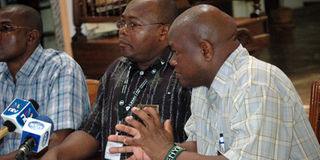Medics lack skills to treat Ebola

Raphael Gikera (right), the editor of the Association of Kenya Medical Laboratory Scientific Officers, and the association's chairman, Moses Lorre, address journalists at the Reef Hotel in Mombasa on Wednesday about the lack of preparedness to deal with an Ebola outbreak. PHOTO | LABAN WALLOGA |
What you need to know:
- “If you are found with Ebola-like symptoms in those areas, where will you be taken and who will carry the specimens?” association editor Raphael Gikera posed.
- “Laboratory professionals, who are supposed to handle Ebola at the most infectious stage have not been trained,” he said.
- Kenyans are not safe too, in the prevention and treatment of HIV, as there is a proliferation of dubious testing kits aggravated by lack of supervision by medical regulators, the participants said.
Kenya is not ready to deal with an Ebola outbreak, doctors warned on Wednesday.
Less than one per cent of health workers have been trained on the management of the disease, they said.
There is only one treatment centre based at the Kenya Medical Research Institute (Kemri) in Nairobi, and public health laboratories, they added, are not equipped to handle an outbreak. The public, meanwhile, is ignorant of the disease or how to prevent it.
MOST INFECTIOUS STAGE
There is also no proper policy for managing the disease or its outbreak, said Moses Lorre, the head of the Association of Kenya Medical Laboratories Scientific Officers. He was speaking at a press briefing at the Reef Hotel in Mombasa.
“Laboratory professionals, who are supposed to handle Ebola at the most infectious stage, have not been trained,” he said.
ALSO READ : AFRICA AIRLINES FACE DEATH FROM EBOLA
“The preparedness we are talking about has many facets. Ebola can pass through many areas. If Nairobi is prepared, is Busia, Lamu or other regions prepared?
“If you are found with Ebola-like symptoms in those areas, where will you be taken and who will carry the specimens?” association editor Raphael Gikera posed.
He noted that all body fluids of a patient with Ebola are infectious.
“At the Jomo Kenyatta International Airport, there is no isolation room. If you suspect someone has Ebola, they have to be taken to Kenyatta National Hospital,” Mr Gikera said.
He stressed that containing Ebola required public understanding of what to do. The government, through the Ministry of Health, has been “silent”, he said, on disclosing information about its preparedness, including how many people have been trained.
DUBIOUS TESTING KITS
Kenyans are not safe either in the prevention and treatment of HIV, as there is a proliferation of dubious testing kits aggravated by lack of supervision by medical regulators, the participants said.
Mr Lorre said that only rapid test kits are used at HIV counselling and test sites across the country without proper mechanisms for quality assurance and quality control.
The Kenya Medical Laboratory Technicians and Technologists Board, which has the mandate to ensure use of quality facilities for testing illnesses, was also lax in its supervision, he charged.
“Without proper quality control, there is (a) grave danger of misdiagnosis. Testing kits arrive in the country as regular goods, which are not supervised by medical experts,” he said.
The association officials also warned about the existence of quack laboratories and training institutions even with a regulatory board that is supposed to weed them out.
“In the last year, institutions and professionals have paid money to the board without receiving service, professionals have remained without licences and medical labs have been faced with rogue inspectors extorting money,” Mr Gikera said.
He warned that the fake labs and technicians could be giving wrong diagnosis to the public.





